Why do people from the hometown of African coffee like chewing coffee?
One thing I am very curious about is that coffee comes from Africa, but in many parts of Africa, especially in small towns and villages, few people drink coffee.
This time I visited the hometown of Uganda, which is rich in coffee, and this question can basically be answered.
In the village of Budadiri in the small town of Mombali, near the Kenyan border in Uganda, there are many coffee farms. The so-called farms are just people who live a clear life. Earlier, they have surrounded a large area of idle land and planted a large number of coffee trees. Of course, there are banana trees, guava trees, pineapple trees, pineapple trees, papaya trees, avocado trees and so on. The reason why these trees can grow with coffee trees is that the water they need can be shared equally, unlike the relative greed of root crops such as cassava, taro and corn for soil and water. Therefore, in the coffee garden, although there is no strong flavor of coffee and can not feel the sweetness of tropical fruits, these land with different colors of fruit trees live in harmony, adding a lot of beautiful and relaxed feeling to people.
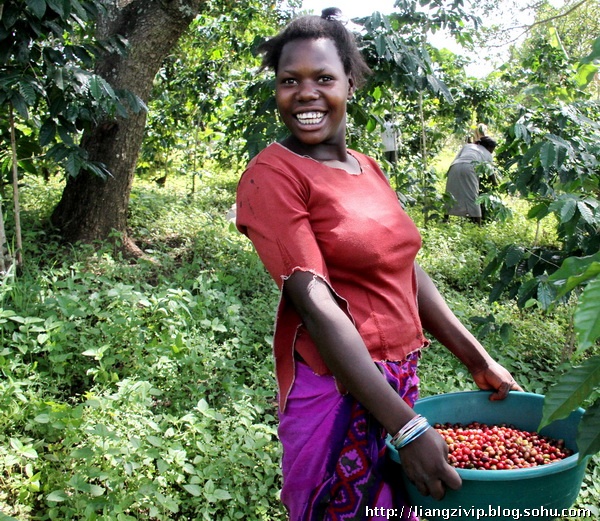
These are the fresh coffee beans just picked by the farmer JAJA KATE's daughter.
In Budadiri village, coffee farmer Jaja Kate owns hundreds of thousands of coffee trees. September to December is the coffee harvest season. I follow him to pick red coffee beans on the coffee farm. At first glance, these ripe coffee beans look like small cherries, the color is very attractive. Ask these coffee pickers again, either his daughter or his son.
"Why does he have so many children? Are you rich enough to grow coffee trees, so you try your best to marry and have children? " I asked him jokingly.
"No, I have only one wife, and she has given birth to ten children for me. But as a matter of fact, I have a total of 25 children. most of the other children are homeless orphans or their parents are my friends. Some of them are specially entrusted to me before they die, and some of them are too sick to raise the children, so they hand them over to me. I send them to school, and the older children have graduated, they help me work on the farm, we are a big family, and when I die, these trees are given to them. They won't go hungry. " Jaja Kate is very talkative and happy to live. He takes his children to pick coffee beans and sing songs. The relationship between their big family and these coffee trees is like relatives. They revolve around these coffee trees every day and know the growth of each tree like the back of their hand.
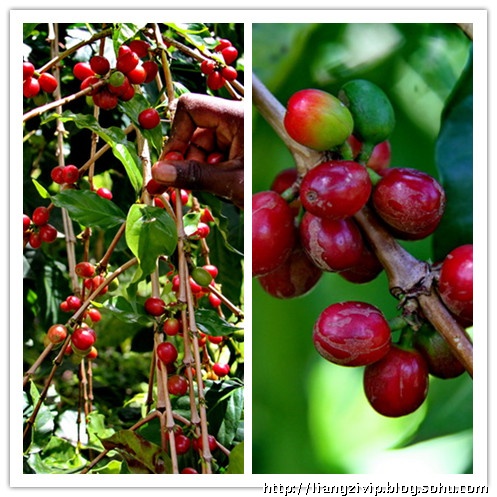
These fresh coffee beans, which look like cherries, taste very different.
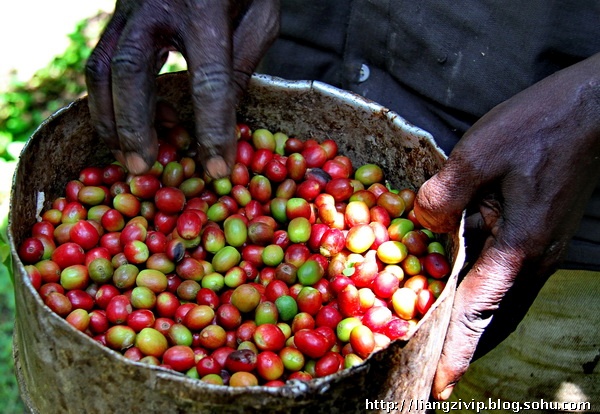
According to theory, the red coffee beans are considered to be fully ripe, while the green ones should wait for three or five days before picking, but the man can't wait to pick all the red and green coffee beans. He explained that they will be fully ripe in two days.
According to Jaja Kate, the coffee tree is fastidious in its growth. It likes cool places and is most suitable for areas with plenty of water, especially if it is covered with volcanic ash. The conditions of high-quality coffee trees are quite strict: sunshine, rainfall, soil, climate and so on, will affect the quality of coffee. Sunshine is an essential element for the growth and fruiting of coffee, but strong sunlight will also affect the quality, so at this time, we need the surrounding banana trees, mango trees and other fruit trees to help block the sun in order to achieve a natural balance of sunshine. Due to the requirements of sunshine and drainage, coffee trees are generally planted on hillsides.
Coffee originated in Ethiopia in Africa, and then spread to Yemen in the Arab region of the Middle East, so some people call it "Arabica". Then it spread to Java, Indonesia, and from there to Latin America. African coffee was previously grown in Congo, Uganda and other places, for Robusta coffee, there is a kind of growth in Liberia, for Liberia (Liberica). In 1753, Swedish botanist Carl van Linnay (Cari Ven Linne) divided coffee into three main species: Arabica coffee (about 70% of the world's coffee), Roberts coffee (used to account for 25% of the world's coffee), and Liberica coffee, which is now almost unknown. In recent years, Arabusta Coffee, a hybrid of Arabica Coffee and Robster Coffee, has emerged.
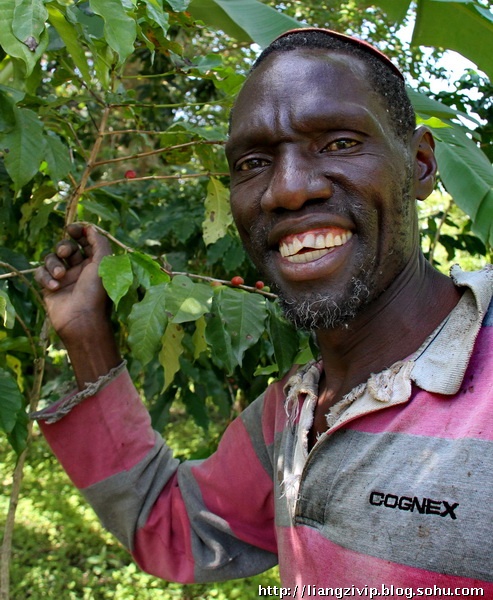
Jaja Kate, a farmer with hundreds of thousands of coffee trees, is a veritable landowner in the area, but his charitable heart has won the admiration of the locals.
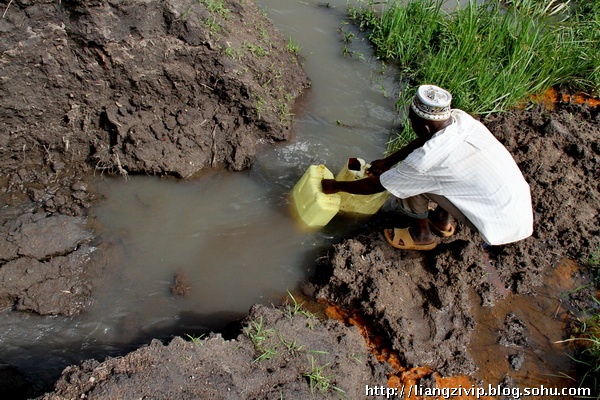
At present, the conditions in the village are limited, we can only use the water in the river to wash the coffee beans, although the water is a little turbid, but there is absolutely no pollution, it is pure natural water.
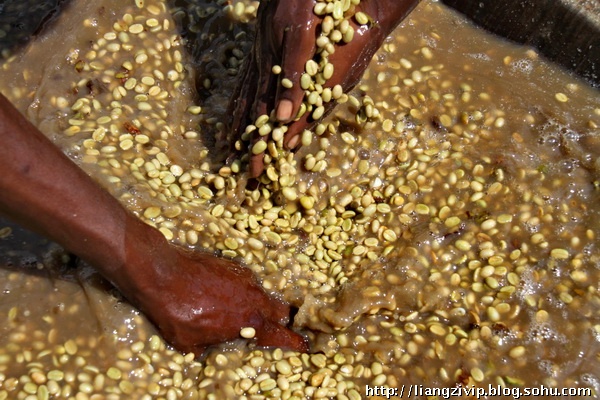
If you don't arrive at the scene, you don't know that there is a layer of glue outside the raw coffee beans. if you don't wash it hard, it's hard to wash off this mucus. If you take this mucus for subsequent drying and processing, it will directly affect the quality of the coffee beans.
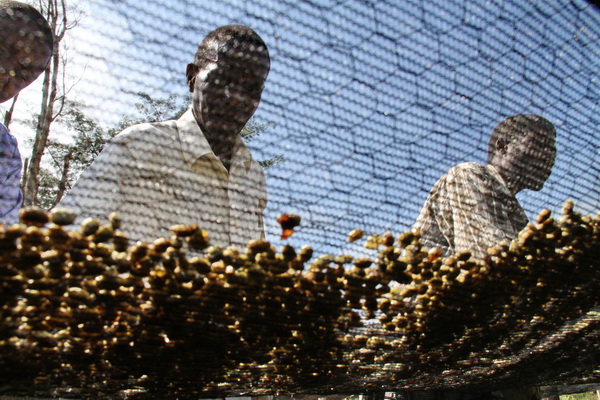
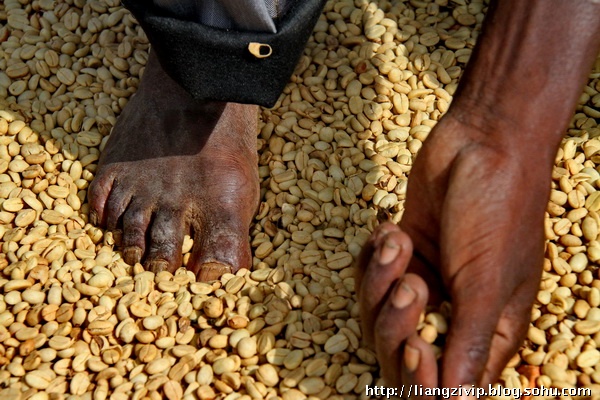
Drying coffee beans is also a process of sorting, during which thousands of pairs of eyes are not enough, because coffee beans are uneven, and it takes a lot of patience to pick out extremely shoddy beans. Hands and feet may not be enough.
At present, the coffee grown by Jaja Kate belongs to Arabica coffee, and it is also an excellent coffee bean, which is, of course, related to the soil and temperature in this area. As a result, he was very proud, but when asked if he drank coffee, he said that it was only occasionally and not a daily necessity.
"since you deal with coffee beans all the year round, why don't you like coffee?" I asked him.
"although coffee beans originated in Africa, drinking coffee is not a hobby inherited by our ancestors. We didn't have baking skills. At that time, at best, we mashed the dried coffee beans by hand and added some boiled water to drink. In fact, we like to chew sun-dried coffee beans best. Including in the national engagement and marriage ceremony, the woman's family is to send dried coffee beans to the man's family and connect the hearts of the two families with coffee fruits. This is our real traditional custom. "
Now I finally understand why coffee drinking is not as popular locally as in Europe and the United States. Of course, in addition to the more difficult baking technology, there is also a very important reason why local people make a living by selling coffee beans, so they are not willing to drink coffee beans of good quality by themselves. you can also appreciate the pleasure of being simple and caffeinated.
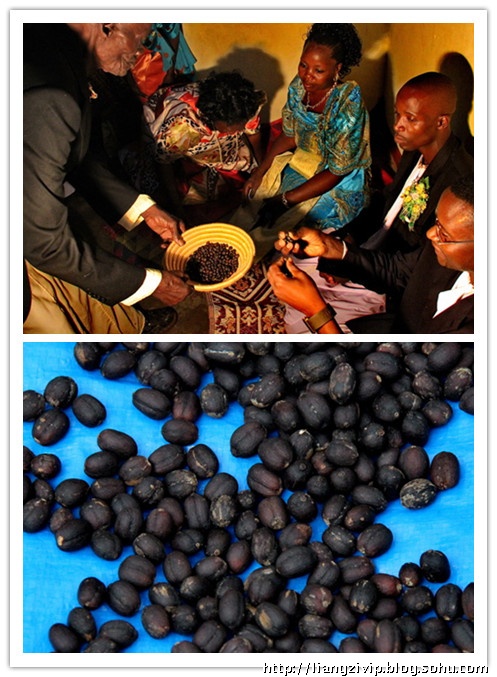
Finally, there was an engagement ceremony for the Buganda people, and the last item of the ceremony was that the parents of the woman really handed the dried coffee beans into the hands of the prospective bridegroom and his relatives, and then everyone shared the joy of chewing coffee beans, which also indicates that the marriage can continue peacefully and beautifully.
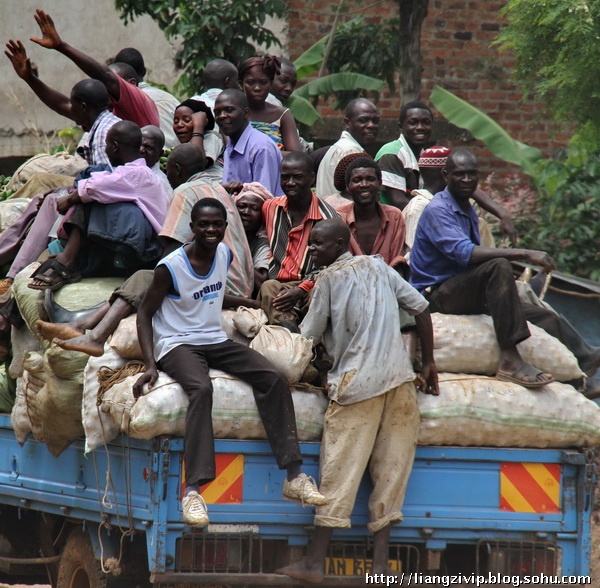
In Uganda, coffee farming is one of the pillar industries of its exports. Now, with the continuous expansion of the export industry, there are gradually many people involved in this work, every year during the coffee harvest season, these people will rush to various coffee farms to survive, so as to support the whole family.
Arabica coffee beans in Uganda account for only 15% of the country's total coffee production, and Uganda's best coffee is mainly produced in the mountains of Elgon and Bugisu along the Kenyan border in the north-east and Ruwensori in the west.

This is a cappuccino made by senior engineer DICK at a local coffee laboratory with a mixture of the freshest Arabica coffee and Robst coffee. It tastes so delicious that we can't enjoy it in any coffee shop in the country. (this article is reproduced)
Important Notice :
前街咖啡 FrontStreet Coffee has moved to new addredd:
FrontStreet Coffee Address: 315,Donghua East Road,GuangZhou
Tel:020 38364473
- Prev

The definition and concept of Fine Coffee beans and Fine Coffee
Boutique coffee beans 1. Boutique coffee beans must be high-quality beans with flawless beans. It should have an outstanding flavor, not without a bad taste, but with a particularly good taste. two。 Boutique coffee beans must be excellent varieties, such as the original bourbon species, mocha species and Tippica species. The coffee beans produced by these trees have unique aroma and flavor, which are far from comparable to those of other tree species.
- Next

Espresso basic espresso (espresso) is the essence of coffee.
In terms of pure sensory entertainment, there are few experiences in daily life that can be comparable to a good cup of coffee. The charming fragrance of a cup of hot, smoking coffee just brewed from freshly roasted beans can pull sleeping people out of bed and lead passers-by into the cafe. There are millions of people around the world who are not caused by caffeine in their coffee for a while.
Related
- Detailed explanation of Jadeite planting Land in Panamanian Jadeite Manor introduction to the grading system of Jadeite competitive bidding, Red bid, Green bid and Rose Summer
- Story of Coffee planting in Brenka region of Costa Rica Stonehenge Manor anaerobic heavy honey treatment of flavor mouth
- What's on the barrel of Blue Mountain Coffee beans?
- Can American coffee also pull flowers? How to use hot American style to pull out a good-looking pattern?
- Can you make a cold extract with coffee beans? What is the right proportion for cold-extracted coffee formula?
- Indonesian PWN Gold Mandrine Coffee Origin Features Flavor How to Chong? Mandolin coffee is American.
- A brief introduction to the flavor characteristics of Brazilian yellow bourbon coffee beans
- What is the effect of different water quality on the flavor of cold-extracted coffee? What kind of water is best for brewing coffee?
- Why do you think of Rose Summer whenever you mention Panamanian coffee?
- Introduction to the characteristics of authentic blue mountain coffee bean producing areas? What is the CIB Coffee Authority in Jamaica?

